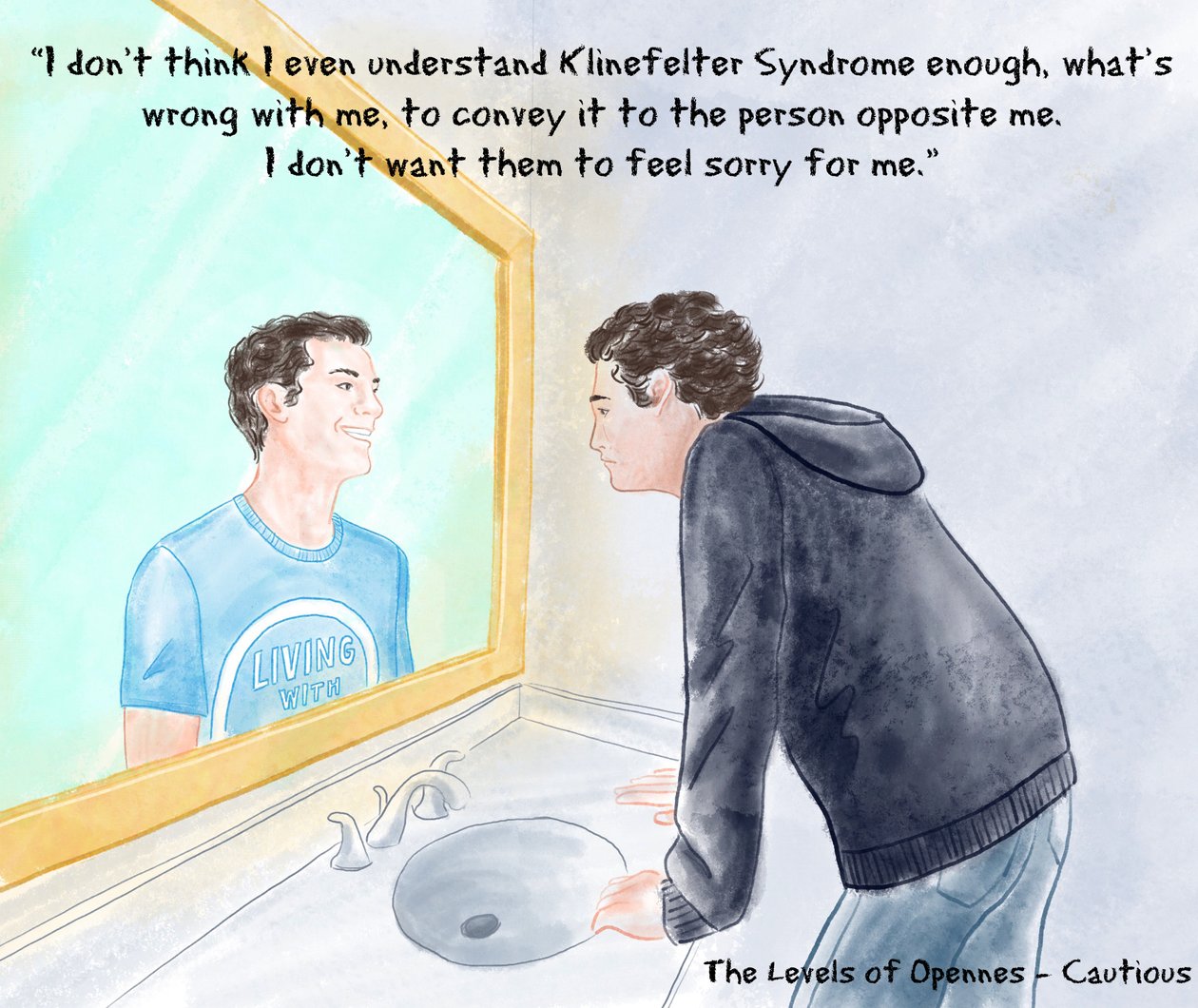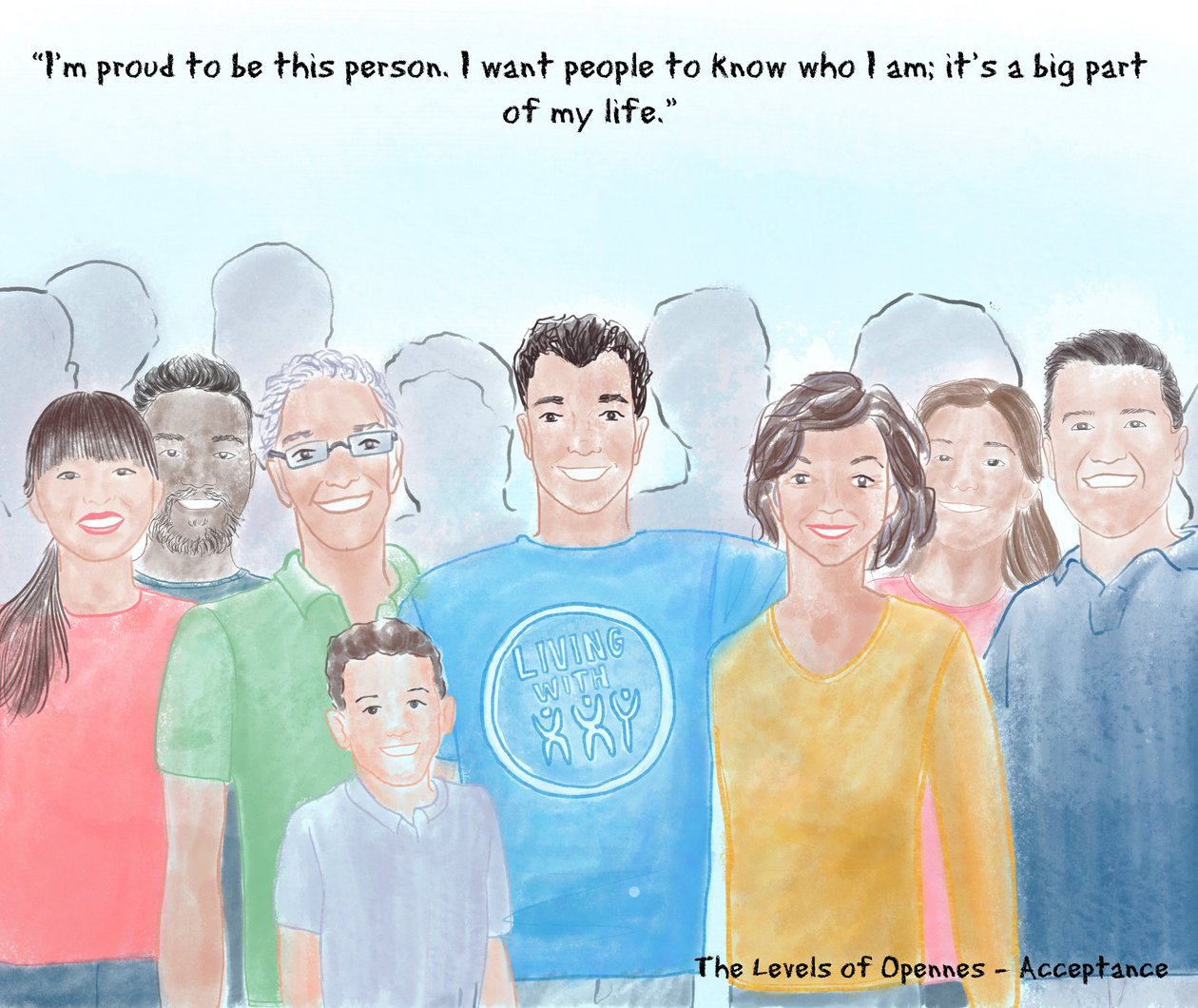
What is Klinefelter Syndrome?
Guide to XXY Symptoms, Treatments & Characteristics
Klinefelter syndrome, often abbreviated as KS or referred to as “XXY,” affects about 1 in 650 males, though many remain undiagnosed. According to the National Library of Medicine, only around 35% of people with Klinefelter syndrome are ever formally diagnosed, and often the condition is discovered incidentally or later in life. Though the condition is relatively common among chromosomal variations, public awareness and understanding is extremely limited.
Klinefelter Syndrome was named after Dr. Harry Klinefelter, who first described the syndrome in 1942. The diagnosis refers to males who carry one or more extra X chromosomes, most commonly resulting in the XXY karyotype. Klinefelter syndrome is not an illness in the traditional sense, and many individuals with XXY live full and rewarding lives; folks with XXY often live without even knowing they carry the condition.
At Living With XXY, our goal is to bring awareness to Klinefelter Syndrome, create a supportive community for those who have been diagnosed, and provide resources that help our members live happy and fulfilling lives. Additionally, we often speak with parents who have discovered that their child (or soon-to-arrive baby), has been diagnosed with XXY.
If you would like to share your story, connect with others, or simply learn more about this condition, we welcome you to our community.
Join Our Community
What Is Klinefelter Syndrome (Also Called 47,XXY)?
Klinefelter syndrome is a genetic condition that occurs when a male is born with at least one extra X chromosome. While most people assigned male at birth have an XY karyotype, individuals with Klinefelter syndrome typically have an XXY pattern. Some may even carry more than one additional X chromosome, but XXY is the most common presentation.
This chromosomal variation happens randomly and is not inherited. It arises during the formation of reproductive cells (either in the egg or sperm) through a process called nondisjunction. This means the chromosomes don’t separate properly, and the result is an embryo with an extra X. The additional chromosome affects the development of sexual characteristics and hormone production, most notably testosterone.
While it’s classified as a chromosomal difference, Klinefelter syndrome is not contagious or preventable. It also isn’t considered a disease or disorder in a pathological sense. Instead, it's a naturally occurring genetic variation that can present in many different ways.

A Scientific Description of Klinefelter Syndrome
From a scientific standpoint, Klinefelter syndrome is categorized as a sex chromosome aneuploidy. In XXY individuals, the extra X chromosome disrupts typical male sexual development, particularly in the function of the testes. This can lead to underproduction of testosterone, known as hypogonadism.
Many individuals with XXY have small testes, low sperm counts, and reduced testosterone levels. These changes may not be noticeable until puberty or adulthood, and this contributes to the high rate of undiagnosed cases. Clinicians may use a lab procedure that analyzes chromosomes, known as a karyotype test, to confirm the diagnosis. Hormone tests, semen analysis, and physical evaluations may also be part of the diagnostic process.

Physical Characteristics of Klinefelter Syndrome
Physical features vary but may include taller-than-average height, longer limbs, and reduced muscle mass. Many men with XXY have broader hips and less facial or body hair than their peers. Some may carry more fat around the midsection, leading to a body composition that differs from typical male patterns.
Testosterone plays a major role in these traits. Low levels during key developmental periods can affect physical appearance and energy levels. In some individuals, gynecomastia develops during puberty due to hormonal imbalances. XXY, which is woefully misunderstood even by healthcare professionals, can cause self-consciousness, but this is treatable if desired.
Bone density may also be lighter in men with XXY. Research has found that men with Klinefelter syndrome are more likely to have reduced bone mineral density, and while this can increase the risk of osteoporosis, testosterone replacement therapy has been shown to improve these outcomes.

Klinefelter Syndrome Exists on a Spectrum
One of the most important things to understand about Klinefelter syndrome is that it doesn’t follow a fixed template. There’s a wide range of possible traits, from minimal symptoms to more pronounced hormonal and physical differences. In this regard, it’s just like autism; some individuals have pronounced symptoms that require treatment or therapy, and others don’t even realize they are “on the spectrum.”
Some boys may only show mild language delays in early childhood and go on to lead typical adult lives without any further signs. Others may notice issues with muscle tone, energy, or sexual development during adolescence or adulthood. In some cases, the condition is only discovered during fertility testing.
There are also rarer forms, such as 48,XXXY or 49,XXXXY, which involve even more X chromosomes. These variations often come with more significant developmental and physical effects. Still, many individuals with these conditions find ways to thrive.
How Is XXY Treated?
Klinefelter syndrome is not a disease, and therefore doesn’t need to be “cured.” That said, many individuals benefit from supportive care and medical treatment designed to address specific concerns.
Testosterone Therapy
Low testosterone is one of the most common medical concerns in men with XXY. Testosterone replacement therapy (TRT) can help with energy, muscle mass, libido, mood, and bone strength. The earlier treatment begins (especially around puberty) the more effectively it may support typical male development.
Injections, gels, patches, and other delivery methods are available, and treatment is often customized to individual needs. Regular monitoring is important to ensure hormone levels stay within a healthy range.
Fertility Options
Most men with Klinefelter syndrome produce little or no sperm. However, fertility treatments have advanced significantly. A method known as testicular sperm extraction (TESE) can sometimes retrieve viable sperm, especially when combined with intracytoplasmic sperm injection (ICSI). These methods offer real possibilities for biological parenthood in some cases.
Note that research has shown that TESE is often more effective when performed during adolescence or young adulthood, before further degeneration of the testicular tissue can occur. But for families and individuals considering this route, early consultation with a reproductive endocrinologist can help preserve future fertility options.
Nutrition and Fitness
Healthy eating and regular physical activity can play a big role in maintaining energy and muscle tone. Because individuals with XXY may have a higher risk of weight gain and metabolic conditions, we urge you to keep your XXY child active! Resistance training, aerobic exercise, and a balanced diet all contribute to improved quality of life. You may even want to start them with a personal trainer at an age earlier than most people would consider such an investment.
Emotional and Psychological Support
Like anyone else, people with Klinefelter syndrome benefit from emotional support. Some individuals experience anxiety or depression related to their diagnosis or its symptoms. Connecting with our support group here at Living With XXY can help, and we would be happy to provide further resources.
Like anyone else, people with Klinefelter syndrome benefit from emotional support. Some individuals experience anxiety or depression related to their diagnosis or its symptoms. Connecting with our support group here at Living With XXY can help, and we would be happy to provide further resources.

Klinefelter Syndrome Does Not Preclude Anyone From a Happy Life
From quiet traits that go unnoticed to more visible symptoms that require medical intervention, the experience of living with XXY is deeply personal and exists on a spectrum. But with awareness, early care, and the right support, individuals with Klinefelter syndrome can live incredible lives.
More people are being diagnosed now than ever before, not because the condition is becoming more common, but because doctors and families are becoming more informed. Whether diagnosed in childhood or discovered later in life, the individual's journey deserves accurate information, medical insight, and the recognition that people with XXY can live meaningful and successful lives.
Learn About Positive Traits
Frequently Asked Questions
- Klinefelter syndrome is a genetic condition in boys and men who have an extra X chromosome.
- Klinefelter’s, 47,XXY, XXY, XXY syndrome, and KS are all different names for Klinefelter syndrome.
Klinefelter syndrome is part of a bigger group of genetic conditions called sex chromosome aneuploidies (SCAs). The X and Y chromosomes are called sex chromosomes; individuals typically have two sex chromosomes. “Aneuploidy” means an abnormal number. So sex chromosome aneuploidies include all conditions that have one or more than two X and/or Y chromosomes. There are many other names that SCAs may go by, such as X&Y chromosome variations, X&Y variations, sex chromosome variations, etc.
There are some other SCA conditions such as 48,XXYY, 48,XXXY, and 49,XXXXY that are sometimes also called “variants” of Klinefelter syndrome. These conditions share some of the features of XXY such as testicular failure in adolescence and tall stature, however, they are more commonly associated with learning/cognitive disabilities, language difficulties, and sometimes more complex medical problems. - Klinefelter syndrome has been referred to as all of these things, and others. The genetic condition is the most neutral of these terms.
- Klinefelter syndrome is caused by having many extra genes on the additional X chromosome. We do not know exactly how these genes lead to the features of the condition.
- Dr. Harry Klinefelter was a medical student when he described several young men with specific physical features in a medical paper in 1942. These features became known as “Klinefelter syndrome”. In 1959, Dr. Patricia Jacobs found out that the reason these men had these physical features was because of an extra X chromosome.
- Studies show 1 in 500-1000 males have an extra X chromosome.
- Historically, studies have shown that ~2/3 of boys with KS were never appropriately diagnosed. These numbers may be decreasing as genetic testing, especially prenatal genetic testing, becomes more common.
- Klinefelter syndrome is diagnosis by a test called a karyotype or chromosome analysis on blood or other tissue type. Sometimes other genetic tests can pick up Klinefelter syndrome as well.
- Infancy/Toddlerhood
Often no signs or symptoms are noticeable in infants and young boys- Low to normal muscle tone
- Difficulty with breastfeeding
- Easy-going baby
- Mild delay in milestones
- Undescended testes or small penis size
- Allergies / Recurrent respiratory infections / Asthma
Childhood- Kind, loving, eager-to-please personality
- Difficulty with language-based academics (reading, writing, reading comprehension)
- Social immaturity relative to peers
- Attention or focus difficulties
- Anxiety
- Challenges with motor planning or coordination, handwriting Low energy or fatigue
- Sensory sensitivities or becoming easily frustrated
- Allergies / Recurrent respiratory infections / Asthma
Adolescence and Adulthood- Taller stature
- Puberty differences: Puberty usually starts at a normal time and penis size and pubic hair development are usually normal, so differences can be hard to notice. Testicles stop growing or get smaller in mid-puberty and produce less testosterone, which can lead to less facial hair, lower muscle mass, and breast tissue development. Treatment with testosterone can help prevent or treat these problems if they occur.
- Infertility Increased fat tissue on hips and abdomen
- Abnormal cholesterol, pre-diabetes or diabetes
- Difficulty with higher level language skills and social communication skills such as difficulty describing events or thoughts in clear detail, “reading between the lines” in conversations, taking things too literally, or maintaining conversations.
- Anxiety and/or depression
- Attention or focus difficulties, difficulties with organization and planning
- Academic challenges in reading and writing, reading comprehension
- Low energy or motivation, fatigue
- Tremor (shakiness) in hands
- Strengths in visual-spatial tasks, creativity, and art
- Strengths in science/technology/engineering/math disciplines
- Klinefelter syndrome is a spectrum, with some individuals affected very little and others reporting Klinefelter syndrome has a significant impact on their lives. This variability is one of the most important things to know about Klinefelter syndrome – not all males with Klinefelter syndrome will have all of the signs or symptoms described above. Some may have very few developmental or learning challenges. However, almost all will show small testicular size in adolescence and pubertal differences.
- Klinefelter syndrome is best treated with a multidisciplinary team that has experience with individuals with KS. Many of the “classic” signs and symptoms of Klinefelter syndrome can be prevented or treated. Management can include developmental therapies (i.e., physical, occupational, speech therapy), academic supports, healthy lifestyle habits (diet, activity, sleep), treatments for mental health/behavioral difficulties if needed, and testosterone treatment.
- Many boys and men with Klinefelter syndrome have excellent quality of life and very positive outcomes, including being in successful relationships and employment. Most men with Klinefelter syndrome live independently without assistance. However, studies do suggest that men with Klinefelter syndrome may have more challenges maintaining relationships or work compared to others. Quality of life can be affected by physical and mental health conditions. It is important to get support from a team of specialists that understand Klinefelter syndrome to appropriately treat these conditions and achieve positive quality of life.
Stages of Opennes by Emilia Pucci
We conducted a research project within our community to visually highlight the stages someone diagnosed with Klinefelters Syndrome progresses through.
Stay Informed With Every Update
Sign up to receive our latest stories, educational resources, and opportunities to connect with others in the XXY community.
Join The Community Today



